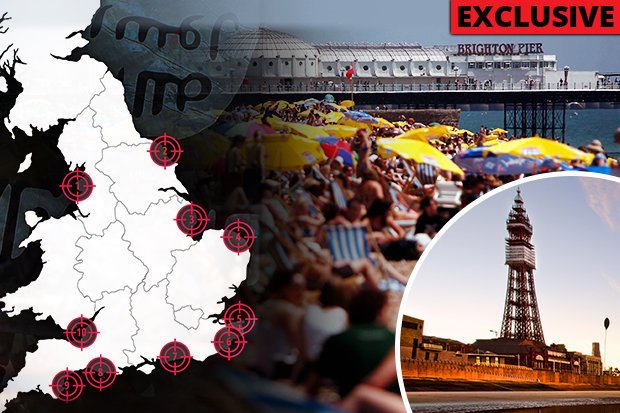
Last year's horror attack, on unsuspecting citizens along Barcelona's Las Ramblas, certainly lead to new security arrangements in that area.
But security experts recognise there is no way of preventing so called low tech attacks outside the cities.
It was revealed that ISIS had ordered more 'truck attacks' only ten days prior to Las Ramblas by calling for followers, already embedded in Europe, to 'ram their crowds until the streets run with their filthy blood.'
There are now signs that ISIS terrorists are planning to replicate the Barcelona attack in smaller, provincial British towns by targeting open promenades in the hope of maximising casualties.
This is being considered a clear warning to open sea-front towns like Brighton, Blackpool, Worthing and Torquay where thousands gather to enjoy the seaside with their ice creams and fish & chips.
It is also considered to be impossible to predict or prevent such random, murderous attacks on innocent people other than to extend the security cordon right out to the ports and borders.
2017: A year of TERROR on Britain's streets?
2017 has seen an unprecedented 34 people die, and 218 people injured in three separate attacks by Islamist extremists on British soil. Is 2017 going to be remembered as the year of terror or simply as the year that a much, much larger problem began?
ISIS scum carried out two vehicle attacks in the UK last year – on London Bridge and Westminster Bridge.
Terrorists' chilling new vehicle tactics are easy in exposed and unprotected places such as the seaside in Nice, in which a lorry rampage killed 87, and the tourist-lined Las Ramblas.
British seaside police forces said they have noted the attack on tourists in Barcelona and are working to 'ensure the protection' of people in Britain.
Meanwhile, local councils claim they have been developing plans to prevent the threat to busy seaside promenades.
Privately everybody admits that the only way to limit the risk is to close the borders and deport everybody who is already on a watch list. A list that is thought to have 23,000 names on it and 10% of those are considered a 'current threat.'
Why those 3000 'current threats' are not rounded up and interned or deported is not being explained. That question is simply not being answered, other than the usual concerns about Civil Liberties and 'people's rights.'
Don't people also have a right to walk along the promenade with an ice-cream free from the fear of being crushed to death underneath a stolen transit van?
There is no doubt that citizens in the so-called 'unprotected' area will be taking their own precautions, including arming themselves.
What is obvious now is that terrorists in Britain face a choice. Either to target a handful of people in closely monitored cities such as London and Manchester or to kill large numbers of people in provincial towns, or 'soft targets' as they are becoming known.
Recent highly publicised and successful vehicle attacks are thought to have motivated and inspired other, currently dormant, jihadis to carry out copycat attacks.
European Police are staging numerous training exercises to be best prepared for future terrorist attacks.
There are two distinct motives behind the location of a jihadi attack, which are geography and symbolism. There is a tradeoff to be made between choosing a high profile target and maximising casualties.
In London and Manchester there is also a trade off between security and public access. Officials cannot close everywhere and even when access for vehicles is prevented there is no way of stopping four or five committed jihadis carrying knives and machetes attacking on foot, as we saw in London's Borough Market earlier in the year.
And when it comes to protecting provincial towns it is impossible to stop large scale vehicle attacks without using Northern Ireland style military checkpoints in and around each location.
Which effectively means rapid response units are only available to deal with secondary attacks and not the initial incident during which citizens are entirely exposed and defenceless.
Last year, former Met Police counter-terror officer David Videcette warned the terrorism threat is poised to move into the provinces – exploiting smaller police forces.
He said: 'Some of the smaller forces do not have the same resources and having to balance a budget means they have fewer officers. There has been a culture of trying to do more with less, but that is something that can be easily exploited.'
John Apter of the Police federations Hampshire branch claimed rural police would be “sitting ducks” should terrorists launch armed attacks.
Councillor Gillian Campbell, deputy leader of Blackpool Council, said: “Blackpool Council has been working with Lancashire Constabulary and their Counter Terrorism Unit and the other emergency services as well as owners and operators of key sites in the town.
“There is nothing to suggest that Blackpool is a target. However, we have developed plans and measures to improve safety in the town during key busy days and events that provide some mitigation without ruining the enjoyment of what people are trying to see and do here in Blackpool."
A spokesman for Norfolk Police said: “In light of the terrorist incident in Barcelona, Norfolk Constabulary will continue to work with partners and local community leaders to review our policing plans, security measures and activities to ensure the protection and security of our residents, public institutions and critical infrastructure in the county."
East Linsdey District Council District, who manage Skegness, said: "We have plans in place to deal with any critical or major incident in the County."
Britain’s current terror level is severe – meaning an attack is 'highly likely.'
Unfortunately there is no certain way to prevent any further Las Ramblas style attacks without securing the bordered, limiting the free movement of people from the European Union and to round up all those currently on a jihadi watch list.
Even these measure will not eliminate all risk but will certainly reduce it considerably. -Albert Jack